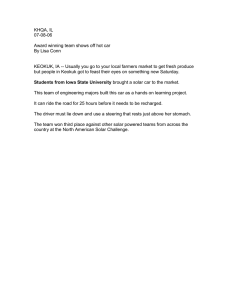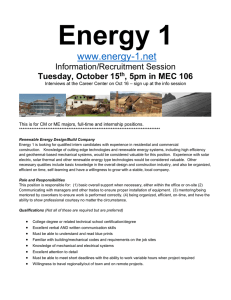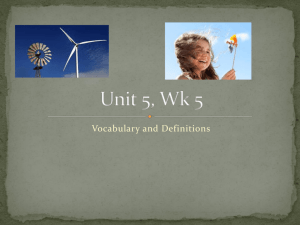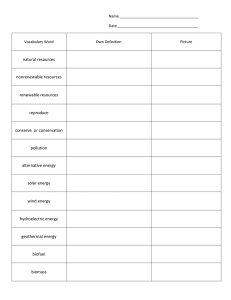2015 Summer Research Camp - Conn Center for Renewable
advertisement
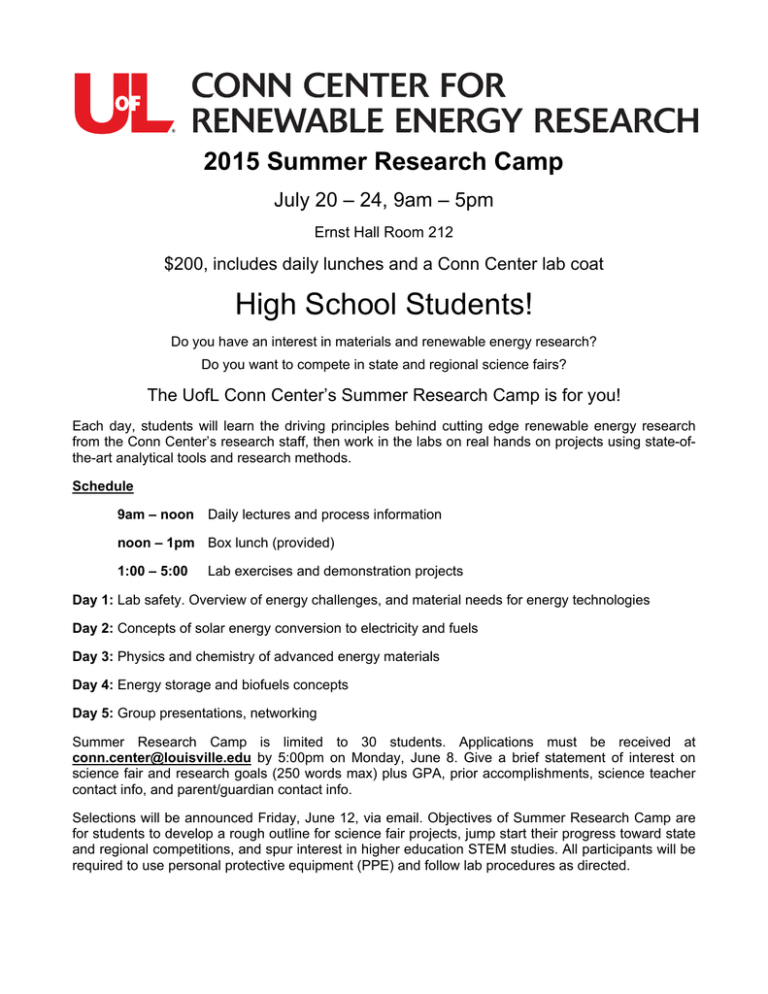
2015 Summer Research Camp July 20 – 24, 9am – 5pm Ernst Hall Room 212 $200, includes daily lunches and a Conn Center lab coat High School Students! Do you have an interest in materials and renewable energy research? Do you want to compete in state and regional science fairs? The UofL Conn Center’s Summer Research Camp is for you! Each day, students will learn the driving principles behind cutting edge renewable energy research from the Conn Center’s research staff, then work in the labs on real hands on projects using state-ofthe-art analytical tools and research methods. Schedule 9am – noon Daily lectures and process information noon – 1pm Box lunch (provided) 1:00 – 5:00 Lab exercises and demonstration projects Day 1: Lab safety. Overview of energy challenges, and material needs for energy technologies Day 2: Concepts of solar energy conversion to electricity and fuels Day 3: Physics and chemistry of advanced energy materials Day 4: Energy storage and biofuels concepts Day 5: Group presentations, networking Summer Research Camp is limited to 30 students. Applications must be received at conn.center@louisville.edu by 5:00pm on Monday, June 8. Give a brief statement of interest on science fair and research goals (250 words max) plus GPA, prior accomplishments, science teacher contact info, and parent/guardian contact info. Selections will be announced Friday, June 12, via email. Objectives of Summer Research Camp are for students to develop a rough outline for science fair projects, jump start their progress toward state and regional competitions, and spur interest in higher education STEM studies. All participants will be required to use personal protective equipment (PPE) and follow lab procedures as directed. Conn Center Summer Research Camp Modules: Solar Manufacturing. Solar energy is fast becoming an important part of the world’s supply of energy. This module will cover the significance of solar energy and the underlying concepts of solar power. It will also include an introduction to the solar panel manufacturing process and participants will take part in making a solar cell. Dr. Thad Druffel, Theme Leader, Solar Manfacturing R&D Solar Fuels. Capturing sunlight in the form of chemical fuels is one of the most promising approaches to store intermittent renewable energy and increase its utility. This module will introduce the fundamentals of photoelectrochemical fuel production. Participants will make a photoelectrode and learn how to characterize it as a component of a solar water-splitting device, and also evaluate a demonstration system in action. Dr. Josh Spurgeon, Theme Leader, Photovoltaic & Photoelectrochemical Device R&D Advanced Energy Materials. Majority of grand challenges in energy depend upon our ability to discover new materials and make advanced materials. In this module, students will learn concepts of making two kinds of materials: (a) make diamond using biogas (methane); and (b) make rust nanowires on iron foils. They will view the samples using a scanning electron microscope and Raman spectroscopy. Dr. Mahendra Sunkara, Director, Conn Center for Renewable Energy Research Energy Storage. Electrochemical energy conversion is a field of technology that includes electrical storage devices such as batteries and supercapacitors. They have become increasingly important for electric vehicles and renewable energy storage. This module will cover various energy storage and power delivery concepts. Participants will take part in making Li-ion batteries, Li-Sulphur batteries and supercapacitors. Dr. Gamini Sumanasekera, Theme Leader, Energy Storage Biomass and Biofuels. The current commercial sources of fuels and organic chemicals are coal, oil, and natural gas. There have been multiple efforts worldwide to replace these sources with renewable carbohydrate-rich biomass resources for environmental reasons. In this module, students will learn basics about lignocellulosic biomass, its conversion to bioproducts, and waste to energy technologies. The students will also take a tour of the labs and see the equipment used for biomass conversion. Dr. Jagannadh Satyavolu, Theme Leader, Biofuels & Biomass Conversion Materials Characterization. New advances in energy efficiency and better energy production and storage require new materials with improved properties and performance. The R&D towards such materials relies heavily on the ability to efficiently characterize and understand materials’ properties and structures. This module will introduce fundamentals of several materials characterization techniques such as electron microscopy (SEM), x-ray diffraction (XRD) and Raman spectroscopy. Inclass lectures as well as lab demos and hands-on exercises are planned. Dr. Jacek Jasinski, Theme Leader, Materials Characterization For more information, contact: Andrew Marsh, Assistant Director Conn Center for Renewable Energy Research University of Louisville conn.center@louisville.edu 502-852-8597 http://conncenter.org/
